Vocabuylary
1. Choose the correct answer A, B, or C to complete each sentence.
(Chọn câu trả lời đúng A, B hoặc C để hoàn thành mỗi câu.)
1. The panda’s natural ____________ is the bamboo forest.
A. habitat
B. ecosystem
C. area
2. This forest provides a habitat for hundreds of ____________ of plants and animals.
A. styles
B. classes
C. species
3. ____________ the environment must be the job of everyone in the community.
A. Caring
B. Protecting
C. Keeping
4. We should ____________ the consumption of single-use products like plastic bottles and bags.
A. reduce
B. encourage
C. raise
5. ____________ trees and burning forests destroy a lot of wildlife habitats.
A. Watering
B. Cleaning up
C. Cutting down
|
1. A |
2. C |
3. B |
4. A |
5. C |
1. The panda’s natural habitat is the bamboo forest.
(Môi trường sống tự nhiên của gấu trúc là rừng trúc.)
2. This forest provides a habitat for hundreds of species of plants and animals.
(Khu rừng này cung cấp nơi ở cho hàng trăm loài thực vật và động vật.)
3. Protecting the environment must be the job of everyone in the community.
(Công việc của mọi người trong cộng đồng là phải bảo vệ môi trường.)
4. We should reduce the consumption of single-use products like plastic bottles and bags.
(Chúng ta nên giảm lượng tiêu thụ các sản phẩm dùng một lần như chai nhựa và túi nhựa.)
5. Cutting down trees and burning forests destroy a lot of wildlife habitats.
(Chặt cây và đốt rừng phá hủy rất nhiều môi trường sống hoang dã.)

Các bài tập cùng chuyên đề
3. Complete each sentence with one word or phrase from the box.
(Hoàn thành mỗi câu với một từ hoặc cụm từ trong hộp.)
|
reduce single-use pollution carbon footprint environment programme |
1. _____ is a serious problem everywhere.
2. We should avoid dumping waste into lakes and rivers to _____ water pollution.
3. We shouldn’t throw away _____ products but recycle them.
4. _____ is the amount of carbon dioxide we release into the environment.
5. We hope a lot more people join our _____.
4. Write a phrase from the box under each picture.
(Viết một cụm từ từ hộp dưới mỗi hình ảnh.)
|
plastic rubbish water pollution single-use products 3Rs endangered species |
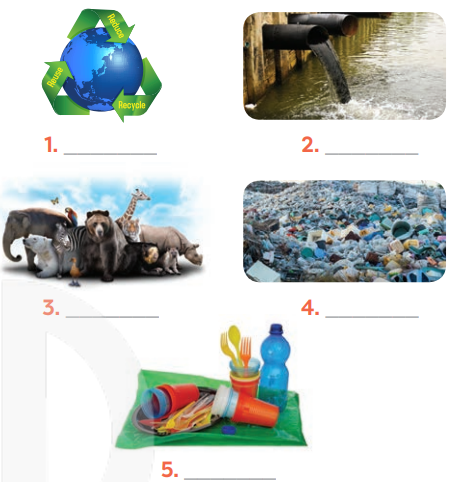
1. Label each picture with a phrase from the list.
(Dán nhãn cho mỗi bức tranh bằng một cụm từ trong danh sách.)
a. building a campfire
b. cutting down trees
c. picking up rubbish
d. protecting endangered species
e. saving water
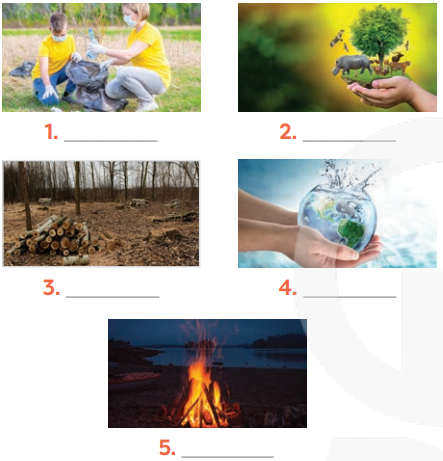
Tick (✓) the actions above that protect the environment.
(Đánh dấu và những hành động bảo vệ môi trường.)
2. Match each word or phrase in column A with its meaning in column B.
(Nối mỗi từ hoặc cụm từ ở cột A với nghĩa của nó ở cột B.)
|
A |
B |
|
1. ecosystem |
a. The process of making water, air, soil, etc. dirty by adding harmful substances. |
|
2. pollution |
b. The practice of protecting the natural environment. |
|
3. habitat |
c. The way living and non-living things in a particular area are related to each other. |
|
4. environmental protection |
d. Animals facing a high risk of extinction in the wild. |
|
5. endangered species |
e. The place where a type of plant or animal lives. |
3. Complete each sentence with a word or phrase from the box.
(Hoàn thành mỗi câu với một từ hoặc cụm từ từ hộp.)
|
habitat cutting down trees ecosystem endangered species carbon dioxide |
1. People in my neighbourhood are doing a lot to save _____.
2. Con Dao National Park provides a rich _____for marine life.
3. Forests help release oxygen and absorb _____; they also provide homes for many species.
4. _____is a serious environmental concern as it harms natural habitats.
5. An _____maybe a whole forest, or a small pond, and it can be of any size.
2. Complete each of the sentences with a word or phrase from the box.
(Hoàn thành mỗi câu với một từ hoặc cụm từ trong hộp.)
| carbon footprint littering picking up rubbish habitat endangered species |
1. Do you know that _____ can cause pollution?
2. One effective way to reduce your _____ is to walk or cycle whenever you can.
3. By planting trees and _____, we can improve our environment.
4. Humans are harming the _____ of bees throughout the world.
5. Animals such as saolas and dugongs are _____.
1. Check the meaning of the words in blue in the eco-intellect fact file.
(Kiểm tra nghĩa của các từ màu xanh lam trong tệp thông tin về trí tuệ sinh thái.)
Check your eco - intellect!
The earth provides everything we need, but how much do you think about it? Develop your eco - intellect by learning how your actions can affect the world we live in.
A. The UK produces more than 1 _________ million tonnes of rubbish 2 _________. On average, each person in the UK throws away their own weight in rubbish every seven 3 _________.
B. Plastic bags damage the environment and kill marine animals. They pollute our towns and cities. We use each plastic bag for an average of only twelve 4 _________.
C. Recycling one aluminium can saves enough energy to power a television for three 5_________. It takes six weeks to recycle your old drink can into parts of a plane, a car or a now can!
D. We must protect our world. We’re running out of natural resources and destroying rainforests. Twenty - four trees make one tonne of newspaper saves 6 _______ trees.
E. In some parts of the world, people can’t afford to buy food. In other parts, people buy more than they need. A typical UK family wastes approximately 7 _________ of food every year.
F. Having a shower instead of a bath reduces the amount of water we waste. A toilet made before 8 _________ uses 60% more water than toilets made since then.
3. VOCABULARY PLUS - Use a dictionary to check the meaning of the words in blue in the text.
(Sử dụng từ điển để kiểm tra nghĩa của các từ tô màu xanh trong văn bản.)
VOCABULARY - The environment and consumerism
8. Cross out the incorrect word.
(Gạch bỏ từ sai.)
1. Don’t waste your rubbish / time / money!
2. I can’t afford a car / problem / laptop.
3. They're going to run out of environment / time / money.
4. It’s important that we recycle all our time / plastic / rubbish.
5. Pollution can damage our environment / money / health.
6. They provided food / water / recycling.
READING - The future of food
9. Complete the words.
(Hoàn thành các từ.)
1. This is a perfect s _ _ _ _ _ _ _ to my problems.
2. Before exams you must d _ _ _ with a lot of stress.
3. What's your v _ _ _ on eating insects? Do you agree we will eat food made with insects as much as possible in the future?
4. Sophie c _ _ _ _ _ _ _ _ me of the advantages of healthy eating.
5. It took me two days to p _ _ _ _ _ _ _ Alan to go to the party.
1. Complete the verbs for the definitions.
(Hoàn thành các động từ cho các định nghĩa.)
1. stop something from being allowed b_______
2. suggest a plan p_______
3. speak or act against something you don’t agree with p_______
4. organise activities to try to achieve something c_______
5. provide help s_______
6. give money, clothes, etc. to charity d________
7. help at an organisation or charity v_______
8. write your name on a document to show you agree with what it says s_______
1. Match the words in blue in the fact sheet with definitions 1–7.
(Nối các từ màu xanh lam trong tờ thông tin với các định nghĩa từ 1–7.)
1. changes from liquid into gas
2. changes from gas into liquid
3. rainfall
4. water when it exists in the air
5. the part of the land or body of water at the top
6. ice is in this state
7. water at room temperature is this
3. Label the diagram with the words in the box.
(Dán nhãn sơ đồ bằng các từ trong hộp.)

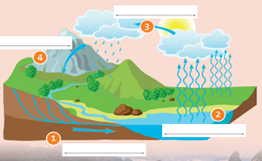
a. Read the words and definitions, then fill in the blanks with the new words.Listen and repeat.
(Đọc các từ và định nghĩa, sau đó điền từ mới vào chỗ trống. Nghe và lặp lại.)
|
affect - make a change in somebody or something (ảnh hưởng - thực hiện một sự thay đổi trong ai đó hoặc một cái gì đó) cause - make something happen, usually something (nguyên nhân - làm cho một cái gì đó xảy ra, thường là một cái gì đó) pollute - make air, water, or land dirty and not safe to use (gây ô nhiễm - làm cho không khí, nước hoặc đất bẩn và không an toàn khi sử dụng) disease - an illness in a person, animal, or plant (bệnh - một căn bệnh ở người, động vật hoặc thực vật) wildlife - animals that live in a natural and free way (động vật hoang dã - động vật sống một cách tự nhiên và tự do) tourism - the business of hotels, restaurants, etc., for people who are traveling (du lịch - kinh doanh khách sạn, nhà hàng, v.v., dành cho những người đi du lịch) environment - the natural world, where plants, animals, and people live (môi trường - thế giới tự nhiên, nơi thực vật, động vật và con người sinh sống) damage - harm something or change something good into something bad (thiệt hại - làm hại một cái gì đó hoặc thay đổi một cái gì đó tốt thành một cái gì đó xấu) |
1. Cutting down trees badly affects the air we breathe.
(Chặt cây ảnh hưởng xấu đến không khí chúng ta hít thở.)
2. Burning trash s our air. It makes the air dirty.
3. We're trying to find out what d death of fish in the river.
4. A healthy diet can prevent many s.
5. The forest is home to lots of .
6. Big storms can trees and buildings.
7. The city built more hotels and cleaned the beaches to improve .
8. We need to reduce pollution to protect our natural .
a. Match the words with the descriptions. Listen and repeat.
(Ghép các từ với các mô tả. Lắng nghe và lặp lại.)
|
1. recycle (tái chế) |
a. make a place clean and tidy (làm cho một nơi sạch sẽ và gọn gàng) |
|
2. reuse (tái sử dụng) |
b. use something again, e.g. a bottle, a bag (dùng lại cái gì đó, e.g. một cái chai, một cái túi) |
|
3. reduce (giảm) |
c. make something new from things you have used before (làm một cái gì đó mới từ những thứ bạn đã sử dụng trước đây) |
|
4. save (tiết kiệm) |
d. use more of something than is needed (sử dụng nhiều hơn một cái gì đó hơn là cần thiết) |
|
5. waste (hoang phí) |
e. a machine that cools and dries the air (máy làm mát và làm khô không khí) |
|
6. clean up (dọn dẹp) |
f. make something smaller or less (làm cho một cái gì đó nhỏ hơn hoặc ít hơn) |
|
7. electricity (điện) |
g. avoid using something (e.g. time, energy), or use less of it (tránh sử dụng thứ gì đó (ví dụ: thời gian, năng lượng) hoặc sử dụng ít hơn) |
|
8. air conditioner (điều hòa) |
h. a form of energy that provides power for machines, computers, TVs, etc. (một dạng năng lượng cung cấp năng lượng cho máy móc, máy tính, TV, v.v.) |
Read the clues and complete the crossword puzzle.
(Đọc các manh mối và hoàn thành trò chơi ô chữ.)
1. There's so much trash in our rivers. We should our rivers.
2. We can use many energy sources to make .
3. Pollution harms many people's .
4. Tourism can cause a lot of pollution because tourists often use plastic bags and bottles.
5. You shouldn't electricity. Always turn off lights when not in use.
6. One of the best ways to trash and pollution is to reuse things.
7. If we take quick showers, we can lots of water.
8. We should make plastic and glass easy to so we can help improve land pollution.
9. The town introduced some plans to protect the . They built a national park to protect the animals.
10. Air pollution can affect people's health and cause many .
Vocabulary
Environmental problems (Vấn đề môi trường)
1. Listen and repeat.
(Lắng nghe và lặp lại.)
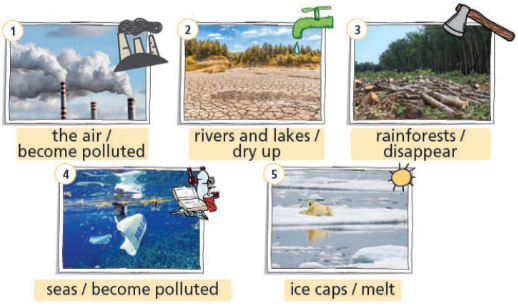
2. Use the following ideas to talk about the problems in Exercise 1 as in the example.
(Sử dụng các ý sau đây để nói về các vấn đề trong Bài tập 1 như trong ví dụ.)
wild animals will have no places to live
(động vật hoang dã sẽ không có nơi để sống)
sea levels will rise
(mực nước biển sẽ tăng)
people will get more health problems
(con người sẽ có nhiều vấn đề sức khỏe hơn)
sea animals will die
(động vật biển sẽ chết)
there will be no clean drinking water
(sẽ không có nước sạch để uống)
If the air becomes polluted, people will get more health problems.
(Nếu không khí bị ô nhiễm, con người sẽ gặp nhiều vấn đề về sức khỏe hơn.)
Vocabulary
1. Choose the correct options.
(Chọn những đáp án đúng.)
1. Forest firefighters need to be brave/caring because their job is dangerous.
2. I want to be a landscape gardener/zookeeper because I love animals.
3. Macaws are endangered because of illegal pet trade/illegal hunting. People sell and keep them as pets.
4. Many animals face habitat/hunting loss because people cut down trees.
5. The Earth is getting warmer because there is climate change/pollution.
2. Fill in each gap with dry up, disappear, melt, air or seas.
(Điền vào mỗi chỗ trống với dry up, disappear, melt, air or seas.)
1. Some endangered animals may if we don't help them.
2. The will become more polluted if we use lots of cars on roads.
3. The river will if it doesn't rain soon.
4. The will become polluted if we throw rubbish in them.
5. The ice caps will unless climate change stops.
1 Find eight more verbs in the wordsearch.
(Tìm thêm tám động từ trong tìm kiếm từ.)
Which five verbs in the wordsearch have a negative meaning?
(Năm động từ nào trong từ tìm kiếm có nghĩa phủ định?)
run out of (hết, cạn sạch)
………………………….
………………………….
………………………….
………………………….

2 Choose the correct verbs for the definitions.
(Chọn động từ đúng cho định nghĩa.)
make something dirty, contaminate
(làm cái gì đó bẩn thỉu, ô nhiễm)
a damage b pollute c waste
(thiệt hại) (gây ô nhiễm) (chất thải)
1 make bigger in size or number (làm lớn hơn về kích thước hoặc số lượng)
a increase b produce c reduce
(tăng) (sản xuất) (giảm)
2 not use and keep for future use (không sử dụng và giữ lại để sử dụng sau này)
a protect b save c reduce
(bảo vệ) (tiết kiệm) (giảm)
3 use more than you need of something, or throw away something useful (sử dụng nhiều hơn mức bạn cần hoặc vứt bỏ thứ gì đó hữu ích)
a waste b afford c pollute
(lãng phí) (đủ khả năng) (ô nhiễm)
4 make smaller in size or number (làm cho kích thước hoặc số lượng nhỏ hơn)
a reduce b increase c produce
(giảm) (tăng) (sản xuất)
5 give, or make something ready for use (cho, hoặc làm một cái gì đó sẵn sàng để sử dụng)
a provide b save c reduce
(cung cấp) (tiết kiệm) (giảm)
6 give something energy to make it work (cung cấp năng lượng cho một cái gì đó để làm cho nó hoạt động)
a use b power c provide
(sử dụng) (năng lượng) (cung cấp)
7 stop something from existing (dừng một cái gì đó đang tồn tại)
a damage b destroy c reduce
(thiệt hại) (phá hủy) (giảm)
8 keep something safe from damage (giữ một cái gì đó an toàn khỏi bị hư hại)
a provide b pollute c protect
(cung cấp) (gây ô nhiễm) (bảo vệ)
3 Complete the sentences with the correct form of the pairs of verbs.
(Hoàn thành câu với dạng đúng của các cặp động từ.)

The factory produces more cars now that it has increased in size.
(Nhà máy hiện sản xuất nhiều ô tô hơn vì quy mô của nó đã tăng lên.)
1 Don’t …………… those old bottles! You can …………….. them and save resources.
2 Last year, they ………………. a bus to the festival for visitors who couldn’t ………….. a taxi.
3 We are ……………. a solar energy park to …………….. 20,000 homes.
4 Two students are talking about how their school could do more for the environment. Complete the dialogue with the correct form of environment and consumerism verbs and add your own ideas.
(Hai học sinh đang nói về cách trường học của họ có thể làm được nhiều hơn cho môi trường. Hoàn thành đoạn hội thoại với dạng đúng của động từ môi trường và chủ nghĩa tiêu dùng và thêm ý tưởng của riêng bạn.)
Melisa: First of all, I think we definitely need to stop throwing away things that we can 1 ……… instead.
Ali: But how?
Melisa: Well, the school could 2 ……….. us with different bins – you know, one for paper, one for glass and one for cans.
Ali: That’s a great idea, but it’s quite expensive. Can the school 3 ………. to buy all those bins?
Melisa: I didn’t think about that. What about 4 …………… electricity? I’m worried about people leaving the lights on, because it 5 …………. the environment.
Ali: Yes, it’s a big deal. Is there anything else? I’ve 6 ………… ideas. How about you?
You: ………………………………………………………………………………………
2 Complete the advert with the words.
(Hoàn thành quảng cáo với các từ.)

In today's digital world, our homes are full of many 1 …………. gadgets. But hi-tech isn't always the answer, is it? We also want to reduce waste and save the planet. In our kitchens, we want 2 …………… food products, and we carry them home in 3 ………….. bags. But what about the equipment we use? Well, in Bolivia there is an alternative to the 4 …………… cooker. The 5 ……….. cooker doesn't need electricity. Instead, it uses the sun's heat to cook food. It saves energy, so it's an 6 ……………. product. The heat goes through a glass panel and temperatures get up to 160°C!
a. Unscramble the words.
(Sắp xếp các từ sau.)
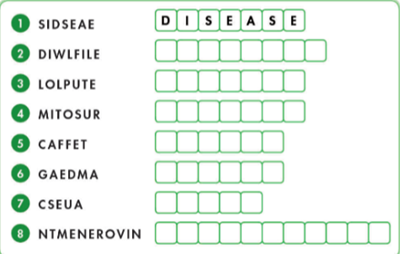
b. Do the crossword puzzle.
(Chơi trò giải ô chữ.)
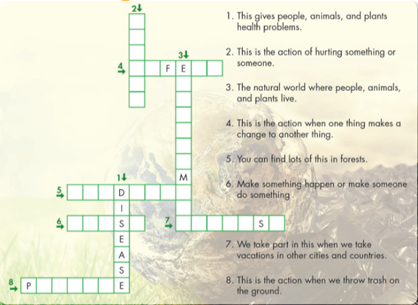
Fill in the blanks with words from the box.
(Điền vào chỗ trống với các từ trong hộp.)

1. We can _______ energy and money if we turn off the lights.
2. We should _______ our forest because there is a lot of trash on the ground.
3. Don’t throw away that bottle because you can put more water in and _______ it.
4. We will have to pay a lot of money if we use too much _______.
5. We have a special bin for paper. It goes to a special place and they _______ it.
6. We should _______ the amount of trash we throw away.
7. Don’t _______ energy because it’s bad for the environment.
8. Only turn the _______ on when the room is too hot.
1. Match the two columns to make environmental problems.
(Ghép hai cột để tạo thành các vấn đề về môi trường.)

2. Choose the correct options.
(Chọn các phương án đúng.)
1. My friends and I are eco-friendly / endangered. We use cloth bags instead of plastic bags.
2. It's important to have clean air to melt / breathe.
3. Rivers and lakes are in danger of rising / drying up.
4. A lot of plants and animals will disappear / pollute if we don't do something to protect them.
5. The flood / rainforest destroyed the village.







Danh sách bình luận